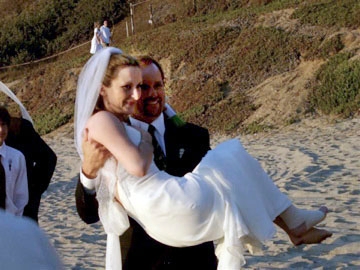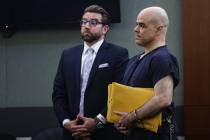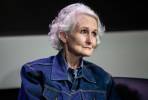Victims, police ‘disappointed’ about loss of ‘Most Wanted’
The last night of Brittany O'Dale's Las Vegas bachelorette weekend is forever etched in her memory.
She would do anything to forget it.
The 28-year-old woman remembers how the crowd panicked on Las Vegas Boulevard that hot August night in 2007 as gunshots cracked through the air. She recalls the sting in her leg and the surprising calm in her voice as she told a friend: "I think I've been shot."
She can flip through the images in her mental photo album: the blood on her "Sexy Little Bride" sash, the ambulance ride, the emergency room where doctors grimly examined her.
"When I was first wheeled in, the doctor turned to me and said, 'Ma'am, we'll do what we can to save your leg,' " O'Dale, a San Francisco resident, recalled last week. "I was so afraid."
She carried her fear, sprinkled with lots of anger, for nearly four years. She was in a wheelchair for her wedding. Her honeymoon plans were scrapped.
And as she groaned through months of recovery and rehab, her shooter fled Nevada and avoided justice.
Last week, when Las Vegas police detective Brendan LeBlanc called her with news of the suspect's arrest, she collapsed in tears of joy, followed quickly by a bout of laughter.
But her gratitude was bittersweet. "America's Most Wanted," the popular fugitive-profiling show that directly led to the arrest, had been canceled by Fox earlier that same week.
"I was really disappointed they (Fox) would take away something like that," O'Dale said. "I felt so lucky they caught him, and I felt I owed that show so much. Now the chances are some suspects won't be caught at all."
CATCH ME IF YOU CAN
After 23 years, Fox pulled the plug on John Walsh's show on May 16, citing financial considerations.
"We have not made money on the show in quite a while," Kevin Reilly, Fox's president for entertainment announced in a conference call. "It was economically getting to the place where it was not really viable."
There will be three more regular episodes. The last is scheduled to air June 18.
Steve Katz, a co-executive producer, said he wasn't sure about the future of the show. There has been speculation about moving it to a different network or creating an international version, but there are no firm plans.
"This is really in John's (Walsh's) hands," Katz said. "We've got three more episodes to do, which gives us three more times to go out and get resolution on cases."
Fox has proposed airing two-hour specials of "America's Most Wanted" four times a year, but no dates were given. And some law enforcement officials were skeptical of moving away from the weekly format, which reaches about 5 million viewers per episode .
"There's nothing available like this where we can reach a national and international audience with such a quick turnaround," said Lt. Lew Roberts, who oversees the Metropolitan Police Department's homicide section. "It's one less tool for law enforcement."
Roberts said his detectives have had great success using the show to catch fugitives.
Last year, Michelle Costello and her son, Peter, were arrested in New Jersey on a Las Vegas murder warrant after someone in an Atlantic City casino recognized them from the show. Both are accused in the 2010 slaying of Michelle's husband, 65-year-old Bert English.
Roberts said the show has yielded crucial tips in other high-profile murder cases, including that of Jane "Cordova" Doe, a 3-year-old girl later identified as Crystal Figueroa, whose body was found in an apartment trash bin in 2006. Also, Margaret Rudin, the wife of real estate developer Ron Rudin, was caught in Massachusetts in 1999 after she became a suspect in her husband's 1994 slaying.
In North Las Vegas, officer Chrissie Coon recalled the 1994 murder of beauty queen Tara Cleveland, who was gunned down by two Hispanic teenagers who then fled to Mexico.
Police struggled to identify the suspects with incomplete information. It wasn't until "America's Most Wanted" aired the story in 2001 that detectives received tips that cracked the case.
"It's not a tool we use every day, but if we need it, then it will be devastating if it's not there," Coon said.
Police in Las Vegas also use the show to identify fugitives who attempt to hide here.
Lt. Clint Nichols, who oversees the Criminal Apprehension Team for the Metropolitan Police Department, said criminals are drawn to the bright lights of Sin City like insects buzzing at light poles.
"We're such a transient population. You'd be amazed how many fugitives pass through Vegas for a last-minute hurrah," Nichols said. "Vegas is a good place to disappear and has that reputation."
In April, Henderson police proved Nichols' point when they arrested an Oklahoma fugitive wanted on child molestation charges. The suspect, who was hiding in a trailer park, was arrested three days after his case was aired on "America's Most Wanted."
"A good thing about the show is it got community involved in catching criminals," said Henderson police spokesman Keith Paul. "It wasn't just police acting on their own."
AND JUSTICE FOR ALL
As of Friday, 1,153 fugitives across the world have been arrested since 1988 with help from "America's Most Wanted" tipsters.
The suspect in O'Dale's shooting, Squad Up gang member Robert Jackson, 25, was number 1,152.
The Aug. 19, 2007, shooting in front of Jimmy Buffet's Margaritaville started with a fight between feuding gangs. It ended when four innocent bystanders -- three of them tourists -- were injured by the gunfire.
Jackson, who was identified quickly by gang detectives, was a fugitive until U.S. marshals caught him May 20 in Chicago .
Lt. John Healy, who supervises the Metropolitan Police Department's gang unit and has employees on the marshals' task force, said he was proud of his detectives' work.
"It's definitely a rewarding thing to be able to notify family members that the person who did harm to their family is being brought to justice," Healy said.
For O'Dale, that justice was sweet. But the shooting dramatically altered her life in ways an arrest can't fix, she said.
Doctors were able to save her leg, but she now has a titanium rod running from her knee to her ankle.
When she left the hospital, it wasn't known if the then-24-year-old would run again. A year later, however, she completed a triathlon.
"I do feel blessed to come out of this as healthy as I was," she said.
She got married on a Malibu, Calif., beach a month after the injury. In a "poetic" moment, her father literally carried her down the aisle, as wheelchairs don't work well on sand.
But the marriage did not last.
O'Dale does not want to blame the shooting for the failure of the relationship, but noted the stress her injury put on the newlyweds.
"It's incredibly taxing on a marriage to play caregiver for six months," she said. "The first six months are supposed to be the most fun."
She hasn't been back to Las Vegas and doesn't know whether she'll ever return.
If there is a criminal trial against Jackson, O'Dale may be asked to testify, but she has reservations about doing so.
She had a layover flight at McCarran International Airport about a year and a half after the shooting. When the city appeared through the clouds, she nearly hyperventilated on the plane, she said.
She hopes time will heal the mental scars and thinks that Jackson's arrest will help her find closure.
Above all, she hopes that Fox reconsiders its stance on the show.
The series was canceled one other time, in 1996, but public outcry forced Fox to bring it back.
O'Dale hopes that happens again.
"Obviously some people watch the show. We know the viewership is out there. That's how these people get caught," she said.
Katz said that although it's tough to lose your job in this economy, that isn't what worries the staff.
Their concern is about the people "America's Most Wanted" serves, he said.
"Everyone who works for John Walsh had the same thought. Where are people going to turn for help now?" Katz asked. "We are the court of last resort. Where are those people going to go?"
Contact reporter Mike Blasky at mblasky@reviewjournal.com or 702-383-0283.




























